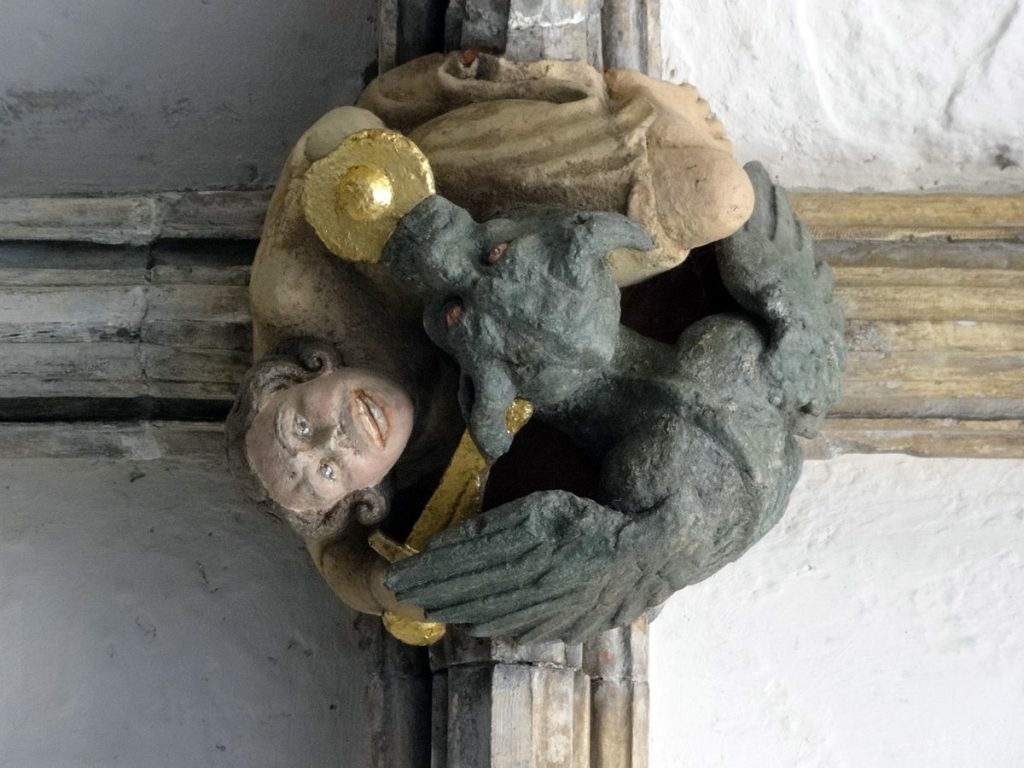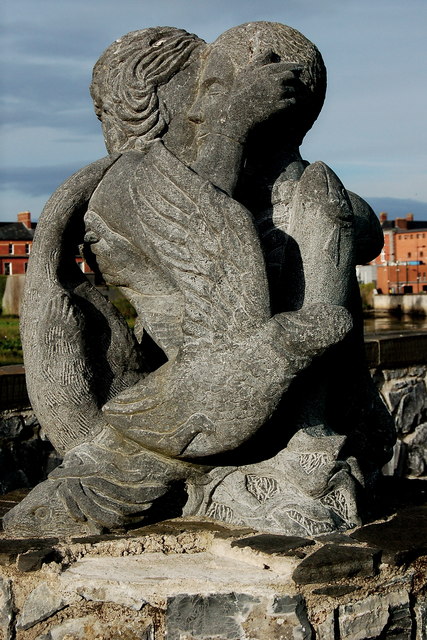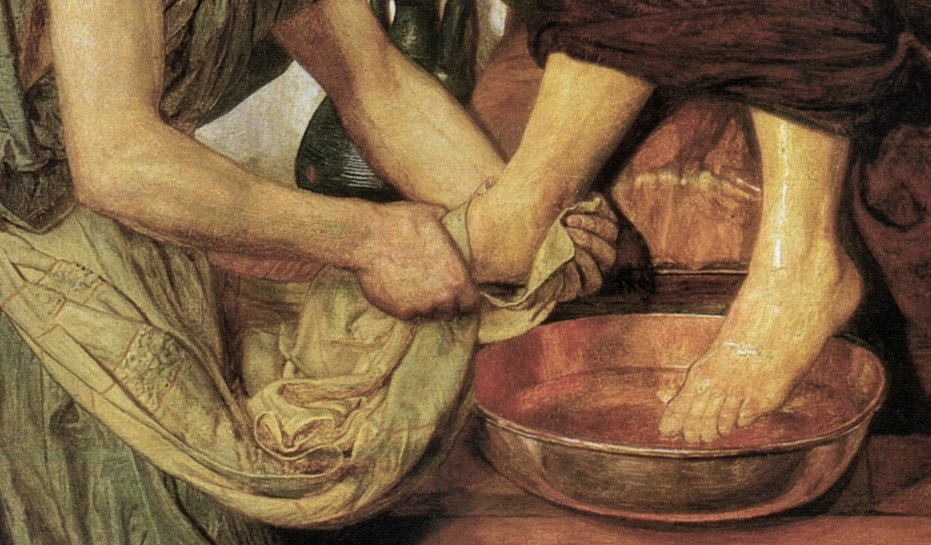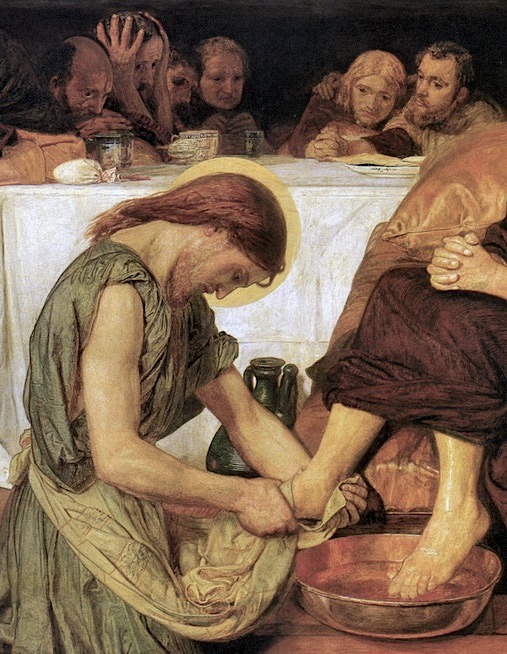Welcome to En-Gedi…
 Featured Article: (from Parables and Stories)
Featured Article: (from Parables and Stories)
Love is the Fulfillment of the Law
by Lois Tverberg
Do not think that I have come to abolish the Law or the Prophets; I have not come to abolish them but to fulfill them. Matthew 5:17-19
People have scratched their heads over what the phrase “fulfill the Law” means. Some say that when Jesus “fulfilled the Law” he got rid of it, even though twice in this passage Jesus says quite forcefully that this isn’t true. By studying other passages in the New Testament and Jewish sayings from around that time, we can understand more fully.
The Greek word in this passage for fulfill is “plerosai” which means “to complete,” “make full,” or “accomplish.” Often it is used in the sense of Christ fulfilling a prophecy. But when it is used along with the Law, it has the sense of “accomplish a goal.” The same word is used in these passages by Paul:
Romans 13:8: Owe nothing to anyone except to love one another; for he who loves his neighbor has fulfilled the law.
Galations 5:14: For the whole law is fulfilled in one word, “You shall love your neighbor as yourself.”
In both places, the idea is the opposite of “getting rid of the law”—it really means to accomplish God’s goal, to obey his will in the best possible way. The word for “law” in Hebrew is “torah,” and it literally means “instruction” or “guidance” and had a very positive connotation. To “fulfill the Torah” was to accomplish God’s will exactly as he would have it. A rabbinic quote helps us understand how it is used:
If one is honest in his business dealings and people esteem him, it is accounted to him as though he had fulfilled the whole Torah. —Mechilta, B’shalach1
In this statement, the idea is that a person who is honest and praiseworthy in all his dealings with others has truly accomplished God’s goal for how he should live. He didn’t cancel the Law, he did it to the utmost!
In Matthew 22:39, Jesus said that the greatest commandment was to “love God and love your neighbor” and said that these summed up all the Law and Prophets. So Paul is saying that when we love our neighbor we are truly hitting the mark, doing exactly what God wants us to do.
 To explore this topic more, see chapter 12, “Jesus and the Torah” in Sitting at the Feet of Rabbi Jesus, Zondervan, 2009, p. 163-179.
To explore this topic more, see chapter 12, “Jesus and the Torah” in Sitting at the Feet of Rabbi Jesus, Zondervan, 2009, p. 163-179.
1 As quoted in J. Telushkin, The Book of Jewish Values, (Bell Tower, New York, 2000), p.4.
Photo: https://www.flickr.com/photos/vshioshvili/
Sons of Hell
by Lois Tverberg
“You travel over land and sea to win a single convert, and when he becomes one, you make him twice as much a son of hell as you are. Matt. 23:15
Jesus’ words are shocking in the passage above, and one wonders about what context could have provoked such a harsh statement from him. Some interesting possibilities arise when we know more about what first-century reality. According to Josephus, a positive attitude toward Judaism was widespread in the Roman Empire. He said,
There is scarcely a nation among the barbarians, nor a city among the more civilized Greeks, that does not greet our customs with enthusiasm, or that does not wish to adopt our dietary customs, our sabbatical rest, even the lighting of our Sabbath candles…..1
And we know from the Gospels and Paul that many God-fearing Gentiles joined the Jews to worship Israel’s God in each town’s synagogue. Jesus healed the servant of the centurion (Matt. 8:5-13) and God sent Peter to Cornelius, who also was a God-fearer (Acts 10). Both Cornelius and the centurion were considered righteous, so it doesn’t seem likely that Jesus was criticizing the practice of inviting Gentiles to worship the true God of Israel.
These Gentiles who worshipped the God of Israel were not considered actual “converts” or “proselytes” to Judaism because they hadn’t become circumcized, which was the sign of the covenant given to Abraham. It may surprise readers today that there were some who were radically opposed to this. Hippolytus (~236 AD) wrote that this was true of some of the Zealots:
But the adherents of another party, if they happen to hear any one maintaining a discussion concerning God and His laws–supposing such to be an uncircumcised person, they will closely watch him and when they meet a person of this description in any place alone, they will threaten to slay him if he refuses to undergo the rite of circumcision. Now, if the latter does not wish to comply with this request, an Essene spares not, but even slaughters. And it is from this occurrence that they have received their appellation, being denominated (by some) Zelotae, but by others Sicarii. 2
The Zealots were violently opposed to the rule of Rome and any friendliness between Jew and Gentile. Josephus relays that some would walk with short daggers and assassinate any Jews that they believed were too sympathetic to the Roman empire, or were not strict enough in their obedience to the law. They were extremely rigid and isolationistic, and wanted Jews to be entirely separate from the pagan world around them. They saw the Scripture as something only accessible by God’s chosen people and no one else. From the passage above, it seems that they would have hated God-fearers and sought to either convert them entirely to their form of Judaism, or else kill them.
Is it possible that Jesus is talking to these people who forced conversions and then recruited from their ranks to make more violent defenders of Judaism? It is hard to know, but it is a possibility. It also gives an interesting background of why Paul was so persecuted by the “circumcision group” and why he had such strong feelings against them. God loves all people, not just the Jews, and he wanted the Gospel to reach all the nations.

1 As quoted in “The Conversion Debate”
2 Refutation of All Heresies, ch. 21.
Photo: https://commons.wikimedia.org/wiki/User_talk:Fæ
Yes Should Mean Yes
by Lois Tverberg
Again, you have heard that it was said to the people long ago, `Do not break your oath, but keep the oaths you have made to the Lord.’ But I tell you, Do not swear at all: either by heaven, for it is God’s throne; or by the earth, for it is his footstool; or by Jerusalem, for it is the city of the Great King. And do not swear by your head, for you cannot make even one hair white or black. Simply let your `Yes’ be `Yes,’ and your `No,’ `No’; anything beyond this comes from the evil one. (Matt 5:33-37)

Many are confused by Jesus’ saying about taking oaths from Matthew. In the Old Testament, God commanded the people to take their oaths in his name, not in the name of other gods (Dt. 6:13), and that they should not swear falsely in God’s name (Lev. 19:12). But in Matthew 5, Jesus commands people to not take oaths at all. Later, James quotes him almost verbatim:
But above all, my brethren, do not swear, either by heaven or by earth or with any other oath; but your yes is to be yes, and your no, no, so that you may not fall under judgment. (James 5:12)
Interestingly, other Jewish teachers are recorded as saying the same thing. Around 200 AD, the Babylonian Talmud records Rabbi Yossi ben Judah as saying: “Let your “yes” be yes, let your “no” be no. (Bava Metziah 49a). Philo, a Jewish philosopher of the first century also said, “The bare word of a virtuous man should be like an oath, steadfast, inviolable, and true. Should necessity absolutely require an oath, let a man swear by his father and mother . . . instead of by the name of the highest and first Essence.” (1)
What was the rationale for avoiding oaths all together? In Jesus’ time, the practice of taking oaths became more and more common; eventually it reached a point where a person’s promises were not believed if he had not done so. In ancient times, God himself was invoked as the witness who would guarantee to punish the oath-taker. But people started to search for other ways to guarantee their words so that God would not be dishonored if what they said did not come true. Swearing by the Temple, the altar, or by heaven was common, and Philo suggests swearing by one’s parents. But still people didn’t feel that their words were binding unless they included some oath.
Jesus pinpoints the necessity of an oath as an issue of integrity. If you have a tendency to break promises and don’t want to profane God’s name, the solution isn’t to swear by something else. Rather, it is to change your attitude so that you become a person who always lives out what you say.
(1) As quoted in “Oath,” Jewish Encyclopedia (Funk and Wagnalls, 1905-1906), in public domain at www.jewishencyclopedia.com.
Photo: https://www.hiscox.co.uk/business-blog/dont-make-promises-you-cant-keep-the-politics-of-business/
Together Again
by Lois Tverberg
Some Pharisees came to him to test him. They asked, “Is it lawful for a man to divorce his wife for any and every reason?” “Haven’t you read,” he replied, “that at the beginning the Creator ‘made them male and female,’ and said, ‘For this reason a man will leave his father and mother and be united to his wife, and the two will become one flesh’? So they are no longer two, but one. Therefore what God has joined together, let man not separate.” (Matthew 19:3-6)
 Sometimes we can better understand Jesus’ teaching when we recognize how he and others of his time read the Scriptures. Oftentimes, this may not be the same way we read them. One example is in the teaching of Jesus’ on marriage. When asked about whether divorce should be permitted for any reason, he quotes Genesis 1:27: “So God created man in his own image, in the image of God he created him; male and female he created them.” To us, this verse doesn’t obviously connect to marriage, and also doesn’t relate to his quotation from Genesis 2:24, that a man will leave his parents and be joined to his wife.
Sometimes we can better understand Jesus’ teaching when we recognize how he and others of his time read the Scriptures. Oftentimes, this may not be the same way we read them. One example is in the teaching of Jesus’ on marriage. When asked about whether divorce should be permitted for any reason, he quotes Genesis 1:27: “So God created man in his own image, in the image of God he created him; male and female he created them.” To us, this verse doesn’t obviously connect to marriage, and also doesn’t relate to his quotation from Genesis 2:24, that a man will leave his parents and be joined to his wife.
However, when we examine how Jews at that time understood the creation of Adam and Eve, a connection begins to emerge. Genesis mentions the creation of mankind twice. In Genesis 1:26-27 it says:
Then God said, “Let us make man in our image, in our likeness, and let them rule over the fish of the sea and the birds of the air, over the livestock, over all the earth, and over all the creatures that move along the ground.” So God created man in his own image, in the image of God he created him; male and female he created them.
Later, Genesis 2 describes how God formed the man from the dust of the ground and then later formed the woman. At first these two creation accounts seem to disagree. Were both male and female created at the same time, as in 1:27, or was the man formed first and the woman afterward, as in chapter 2?
From before Jesus’ time, it was believed that when God first formed the human, he somehow molded both man and woman together in that person. Then, Eve was taken out of Adam since she existed before then too. The verse in chapter 1 that states that God created them “male and female” was understood to mean that each original human was both male and female.
While this seems like a stretch, the Hebrew text supports this in several ways. Before the creation of the woman, Adam is never referred to as a “man” but as ha’adam which means “the human.” It is only after Adam names Eve as ishah, “woman,” that he is referred to as ish, “man.” Also, when God “operates” on Adam, he takes out tzela echad—literally “one side” of him. The translation of tzela as “rib” occurs only here—everywhere else it refers to one “side” of something, like when poles were inserted each of the two sides of the ark in Exodus 37:3. A better description of the scene is that somehow God split Adam in half, and the other half was Eve. They perfectly complemented each other, because they were once one person.
If Jesus read Genesis 1:27 this way, it explains why he used the phrase that God “made them male and female,” to address God’s intentions for marriage. By connecting this verse to “for this reason a man will leave his father and mother and be united to his wife, and they will become one flesh,” Jesus creates a beautiful picture: that in marriage, a man and woman are reunited into one complete person, because that was how they were originally created in the first place.
Part of the beauty of the image is that the Hebrew verb in this line, dabaq, which is translated as “is united,” “cleaves,” or “clings” also refers to romantic love. After the prince of Shechem seduced Jacob’s daughter Dinah, he desperately wanted to marry her. Genesis 34:3 says that he “dabaq” (was deeply attracted to) her. He had fallen in love with her.
Putting all these ideas together within Jesus’ words, we find him saying that because God took apart one whole being to make Adam and Eve, that is the reason why men and women fall in love and want to become one being once again, both physically and spiritually. When they are united in marriage, God himself puts together what he separated at first, and no one should try to tear that apart.
 Photos: Fred Moon on Unsplash, Foto Pettine on Unsplash
Photos: Fred Moon on Unsplash, Foto Pettine on Unsplash
Together Again
by Lois Tverberg
Some Pharisees came to him to test him. They asked, “Is it lawful for a man to divorce his wife for any and every reason?” “Haven’t you read,” he replied, “that at the beginning the Creator ‘made them male and female,’ and said, ‘For this reason a man will leave his father and mother and be united to his wife, and the two will become one flesh’? So they are no longer two, but one. Therefore what God has joined together, let man not separate.” – Matthew 19:3-6
Sometimes we can have a much better understanding of Jesus’ teaching when we see how he and others of his time read the Scriptures, which may not be the same as how we do. One example is in the teaching of Jesus’ on marriage. When asked about whether divorce for any reason is OK, he quoted Genesis 1:27, which says, “So God created man in his own image, in the image of God he created him; male and female he created them.” In our way of reading this verse, it doesn’t have any connection to marriage, and also doesn’t relate to his quotation from Genesis 2:24 that a man will leave his parents and be joined to his wife.
Knowing more about the way the creation of Adam and Eve was understood in Jesus’ time will help us. Twice in Genesis it mentions the creation of mankind – first in Genesis 1:26-27:
Then God said, “Let us make man in our image, in our likeness, and let them rule over the fish of the sea and the birds of the air, over the livestock, over all the earth, and over all the creatures that move along the ground.” So God created man in his own image, in the image of God he created him; male and female he created them.
 Then, later, in Genesis 2, it says that God formed the man from the dust of the ground and then describes how woman was taken out of the first man. At first, these two creation accounts seem to be in disagreement – were both male and female created at the same time, as in 1:27, or was the man formed first and the woman later, as in chapter 2?
Then, later, in Genesis 2, it says that God formed the man from the dust of the ground and then describes how woman was taken out of the first man. At first, these two creation accounts seem to be in disagreement – were both male and female created at the same time, as in 1:27, or was the man formed first and the woman later, as in chapter 2?
The solution might initially seem fantastic, but is supported by the text in several places. From before Jesus’ time, it was understood that when God first formed the human, he somehow put both man and woman together in that person. Then, when Eve was taken out of Adam, it was because she existed before then too. The verse in chapter one that that says that God created them “male and female” was read to mean that each original human was both male and female.
While this seems like a stretch, there are several other ways the text supports this. First, the word adam is a neutral term for human, and before the creation of the woman, Adam is never referred to as a “man” – always as ha’adam which means “the human.” It is only after Adam names Eve as ishah, woman, that he is referred to as ish, man.
Also, when God “operates” on Adam, he takes out tzela echad – literally one side of him. The translation of tzela as “rib” occurs only here – everywhere else it refers to one “side” of something, like when poles were inserted each of the two sides of the ark in Exodus 37:3. A better way to describe the scene is that somehow God split Adam in half, and the other half was Eve, and they perfectly complemented each other, because they were once one person.
 Looking again at Jesus’ words, if he read Genesis 1:27 the same way that other rabbis did, it explains why Jesus would use this verse in terms of God’s intentions for marriage. Jesus is painting a beautiful picture when he connect that verse to “for this reason a man will leave his father and mother and be united to his wife, and they will become one flesh.” Here the image is that in marriage, a man and woman are reunited back together into one complete person because somehow they were originally made together in the first place.
Looking again at Jesus’ words, if he read Genesis 1:27 the same way that other rabbis did, it explains why Jesus would use this verse in terms of God’s intentions for marriage. Jesus is painting a beautiful picture when he connect that verse to “for this reason a man will leave his father and mother and be united to his wife, and they will become one flesh.” Here the image is that in marriage, a man and woman are reunited back together into one complete person because somehow they were originally made together in the first place.
Part of the beauty of the image is in the Hebrew word dabaq, which is translated as “be united,” “cleave to,” “cling to,” or “hold fast.” Delightfully, the word can also mean “to fall in love with”! Genesis 34:3 says that Shechem dabaq Dinah, which is translated “was deeply attracted to her.” Also, 1 Kings 11:2 says that Solomon dabaq (clung to) his foreign wives in love.
Putting this together, Jesus is saying that because God took apart one whole being to make Adam and Eve, that is the reason why men and women fall in love and want to become one being once again, both physically and spiritually. When they are united in marriage, God himself puts together what he separated at first, and no one should try to tear that apart.
Photo: Joseph Mischyshyn
Why All the Woes?
by Lois Tverberg
“Woe to you, teachers of the law and Pharisees, you hypocrites! You are like whitewashed tombs, which look beautiful on the outside but on the inside are full of dead men’s bones and everything unclean.” Matthew 23:27

Jesus confronts the Pharisees many times in the Gospels, so many assume that entire group was corrupt. It may surprise you to know that Jesus’ theology and teaching style was actually very similar to theirs. The Pharisees were a movement among laypeople eager to study God’s word and apply it to their lives, and later many of them became followers of Jesus. From their passion for study they raised up rabbis who traveled the land to teach, just as Jesus did.
When we read Jesus’ seven statements of “Woe to you” it is hard to conclude that there was anything redeemable about the bunch. But believe it or not, the Pharisees were known for their own self-critical sayings that closely paralleled Jesus’ words. They used to talk about both good and bad kinds of Pharisees:
There are seven kinds of Pharisees: the “shoulder” Pharisee, who ostentatiously carries his good deeds on his shoulder so all can see them; the “wait-a-moment” Pharisee, who wants you to wait while he performs a mitzvah (good deed); the bruised Pharisee, who runs into a wall while looking at the ground to avoid seeing a woman; the “reckoning” Pharisee, who commits a sin, then does a good deed and balances the one against the other; the “pestle” Pharisee, whose head is bowed in false humility, like a pestle in a mortar; the Pharisee who asks, “What is my duty, so that I may do it?” as if he thought he had fulfilled every obligation already; the Pharisee from fear, like Job; and the Pharisee from love – like Abraham.
This passage reveals that the Pharisaic movement practiced its own honest self-examination and could see that some in their ranks had fallen into error. They list character flaws very similar to those that Jesus criticized—pride, hypocrisy, and legalism. But still they describe at least one type of Pharisee that is good— one who obeys God’s word simply out of love for him.
Several commentators have suggested that Jesus’ statements might be more like the “seven kinds” saying in another way. They suggest that instead of Jesus accusing every person in the group of the sins he names, each “woe” is is pointed at only the people are falling into those sins. Instead of saying “Woe to all of you – you’re all greedy, legalistic, and hypocritical” he was saying something like, “Woe to you who are greedy, and woe to you who are legalistic, and you who are hypocritical!” Rather than condemning the whole group, he’s pointing out the errors that the group could fall into, just as the rabbis did.
It is easy for us to read these passages smugly, as if only the foolish Pharisees could ever have fallen into these problems. Instead, we should see the sayings of Jesus and the rabbis as wise words to anyone who yearns to obey God. Taking this difficult path leads to many temptations—like slipping into pride, or legalism, or hypocrisy. We also should examine our rationale. Is the reason we are aiming for obedience because we’re terrified by what God will do to us if we don’t do everything perfectly? The only reason we should follow God’s laws is out of love for him, not for any other.
 To explore this topic more, see Sitting at the Feet of Rabbi Jesus, Zondervan, 2009.
To explore this topic more, see Sitting at the Feet of Rabbi Jesus, Zondervan, 2009.
Article photo: Brooklyn Museum
A Strong House
by Lois Tverberg
Why do you call Me, `Lord, Lord,’ and do not do what I say? Everyone who comes to Me and hears My words and acts on them, I will show you whom he is like: he is like a man building a house, who dug deep and laid a foundation on the rock; and when a flood occurred, the torrent burst against that house and could not shake it, because it had been well built. But the one who has heard and has not acted accordingly, is like a man who built a house on the ground without any foundation; and the torrent burst against it and immediately it collapsed, and the ruin of that house was great. – Luke 6:46-49
In this parable Jesus stresses the importance of obeying his words. A similar rabbinic parable from around 70 AD sheds light on Jesus’ lesson in Luke:
Said Elisha ben Abuyah: “A virtuous man who has studied the Law diligently is similar to one who builds a foundation of stones and a superstructure of bricks; though they be inundated, yet they cannot be moved. One who is not virtuous, in spite of having studied the Law, is similar to one who lays stones on a brick foundation: the smallest freshet will overturn the building.” (1)
It is interesting that these parables are so similar. Both address building a house that will endure a flood and the need for a strong, well-laid foundation. And the message of both is identical – that listening must be paired with obedience. The only difference is that the rabbi stresses obedience to the laws of the Torah, and Jesus stresses obedience to his own words.
Much of rabbinic literature emphasizes the importance of pairing study of the Scriptures, especially the Torah, with obedience to God’s word. A distinct feature of Jesus’ teaching in Luke 6 is that he points people to himself and his own words, not just to the Torah. This is initially surprising because Jesus always lived and taught about humility. Yet he readily accepted the title “Lord” which was reserved for royalty, and he expected obedience from those who recognized who he was! It was as if his torah (“teaching,” as the word in Hebrew means), was the natural culmination of all that God taught his people through their Scriptures.
(1) Avot de Rabbi Natan, in Pirke Avot, Babylonian Talmud. An interesting fact about Rabbi Elisha ben Abuyah is that although he was a very highly respected thinker that others widely quoted, rabbinic literature says that later in life he became a “heretic.” Some have postulated that he became a Christian and was rejected because of his new beliefs.
Photo: Daniel Case
Knowing His Voice
by Lois Tverberg
“He calls his own sheep by name and leads them out. When he has brought out all his own, he goes on ahead of them, and his sheep follow him because they know his voice. But they will never follow a stranger; in fact, they will run away from him because they do not recognize a stranger’s voice.” John 10:3-5
Jesus often refers to himself as “the shepherd,” which is not just a lovely poetic image. Rather, it is a bold messianic claim because “the shepherd” is frequently used in Old Testament prophecies about the coming Messiah. For instance, in Ezekiel 34 provides the background to Jesus’ statement about future judgment:
“`For this is what the Sovereign LORD says: I myself will search for my sheep and look after them. As a shepherd looks after his scattered flock when he is with them, so will I look after my sheep. “`As for you, my flock, this is what the Sovereign LORD says: I will judge between one sheep and another, and between rams and goats.” (Ezek. 34:11-12,17)
This passage in Ezekiel explains the judgement between sheep and goats, which Jesus quotes in Matthew 25:32-33. But how exactly does one judge between one sheep and another, or between sheep and goats?
An answer to this question becomes clearer when we begin to understand shepherding. Sheep are shy creatures that run from humans, but once they know a shepherd, they will respond to his or her voice and remain quite loyal to their shepherd. Therefore, if two shepherds meet and their flocks mingle, all they need to do to identify their own herd is to walk away from the other shepherd and call to them; the sheep will then run to their own shepherd. In the passage from John 10, Jesus expresses this relationship between shepherd and sheep, assuring us that his own sheep run toward him and won’t wander off to follow a stranger. Then he makes an even bolder statement in verse 16:
I have other sheep that are not of this sheep pen. I must bring them also. They too will listen to my voice, and there shall be one flock and one shepherd.
Here Jesus is referring to the Gentiles who will follow him in coming ages. His audience would have been shocked because they viewed the Gentiles as hardened and worldly.
An interesting thought occurs to me about the picture that this has for future judgment. Jesus asserts that his own sheep know his voice, and that is what differentiates them from others. What else do sheep know about their shepherd? Do they know the fine points of his theology, like his understanding of the godhead, or predestination vs. free will? No, sheep do not— but they know his voice. They know their shepherd in the Hebraic sense of the word “know,” which can mean loyalty and devotion, not just academic knowledge.
So what do we need to know about Jesus to be saved? Satan probably has more knowledge about Jesus than anyone in the universe, and can explain the various doctrines about him better than any human being. Does that save him? In contrast, is there really any human that has perfect beliefs about Christ, any more than anyone is fully righteous?
Often Christians like to determine the “salvation state” of others by examining the minutia of their beliefs and stances on various issues. Certainly there are basic truths about Christ that must be deep in the soul of every believer, the most important being that he is our LORD, and that he died to redeem us from our sins.
But beyond that, I wonder if when Jesus comes again and judges the sheep and the goats, he won’t ask “what side of the fence were you on with this issue?” Instead, he’ll simply call, and his true sheep will eagerly leap up and bound toward him because throughout their lives they have learned to follow him, and to *know* and love his call.
~~~~
 To explore this topic more, see Sitting at the Feet of Rabbi Jesus, Zondervan, 2009.
To explore this topic more, see Sitting at the Feet of Rabbi Jesus, Zondervan, 2009.
Consider the Ravens
by Lois Tverberg
Consider the ravens: They do not sow or reap, they have no storeroom or barn; yet God feeds them. And how much more valuable you are than birds! Luke 12:24
Why do people work for a living when Jesus promises that God will care for us just as he cares for the ravens? Are we just not trusting God enough for his sustenance? Should we quit our jobs and wait for manna to fall from heaven?
A rabbi from the 2nd century made a relevant observation:
“Have you ever seen a wild beast or a bird who has a trade? Yet they get along without difficulty. And were they not created only to serve me? And I was created to serve my Master. So is it not logical that I should get along without difficulty? But I have done evil and forfeited my right to sustenance without difficulty.” Simeon ben Eleazar, Mishnah, Kiddushim 4:14
Rabbi Eleazar bases his thoughts on the creation story in Genesis. According to Genesis 1:26, humans were made in God’s image to reign over creation-,- so just as a king’s subjects are his “servants,” God decreed that animals are man’s “servants.”
But unlike animals, Adam sinned by eating the apple, and was condemned to toil for food instead of having it easily available. The rabbi explains that because he is a sinner like Adam, he must work hard for his food, unlike the animals.
We can gain from the contrast between the words of Jesus and Rabbi Eleazar. It’s simply a reality of life that we must work and make a living to sustain ourselves, and often our jobs are toilsome and frustrating. We aren’t guaranteed a life free of sweat and labor. But we can trust that through the work that God gives us, he’s providing for our needs, just as he cares for the birds.
Rather than worrying that we’re on our own to scratch out a living, we can rest on the fact that we are precious in God’s sight, and that he’s watching over us. We can do our work to please him because we know he cares for us.
Photo: https://www.flickr.com/photos/capricious/ and Vincent Van Gogh
God’s Servant Heart

by Lois Tverberg
[Jesus] got up from the meal, took off his outer clothing, and wrapped a towel around his waist. After that, he poured water into a basin and began to wash his disciples’ feet… [Afterwards, he said,] “Now that I, your Lord and Teacher, have washed your feet, you also should wash one another’s feet. – John 13:4-5,14
Humility and serving others was of great concern to Jesus. In the above passage, Jesus embodies these themes in his washing of the disciple’s feet. He speaks with disgust about teachers who “love the place of honor at banquets and the most important seats in the synagogues” (Matt. 23:6) and adds, “The greatest among you will be your servant. For whoever exalts himself will be humbled, and whoever humbles himself will be exalted.” (vs. 11-12).
Honor was vital in the first-century Jewish world, and many customs differentiated those with lesser status from those with more. Specifically, students were expected to honor their teachers, and disciples their rabbis. Disciples were to act as servants to their rabbi, serving his food and pouring water over his hands for him to wash. Their model was Elisha who humbly served as Elijah’s mesharet, meaning “assistant” (2 Kings 3:11).
When Jesus washed the feet of his disciples, he not only violated the custom that delegated this task to the lowest household servant but also epitomized humility, as he served those who were supposed to serve him. His actions were even more poignant in light of the argument that the disciples were having over who was the greatest (Luke 22:24-27).
A Similar Scene in Gamaliel’s Life
Interestingly, a similar story is recorded about Gamaliel a few decades later. Gamaliel was the head of the Sanhedrin, the highest office in Israel. At a banquet, he got up and served food and drink to others of lower stature. Some were shocked and rejected his service, just as Peter rejected Jesus’ offer to wash his feet. Honoring a rabbinic scholar is was like honoring the Torah! Surely it shouldn’t be neglected.
A debate ensued about whether the great sage could set aside his own honor to serve others. After considering biblical precedent, the other rabbis declared that he could:
Is Gamaliel a lowly servant? He serves like a household servant, but there is one greater than him who serves.
Consider Abraham, who, even though he was the greatest of his generation, ran to serve what looked like three lowly wanderers (Gen. 18:8).
There is one even greater than Abraham who serves. Consider the Holy One, blessed be He, who brings forth rain and causes the earth to bloom and arranges a table before each and every person. (Psalm 78:19)1
It is interesting that Gamaliel is on record as acting very similarly to Jesus by humbly serving others. He is the same figure who educated Paul and defended the early church in Acts 5:34-40. Could he have been influenced by Jesus’ teaching? Considering that he was familiar with the famous rabbi and his unique movement, it doesn’t seem unlikely.
Paul, a disciple of Gamaliel, beautifully brought all these ideas about the humility of God in the person of Christ himself in his letter to the Philippians:
Your attitude should be the same as that of Christ Jesus: Who, being in very nature God, did not consider equality with God something to be grasped, but made himself nothing, taking the very nature of a servant, being made in human likeness. And being found in appearance as a man, he humbled himself and became obedient to death—even death on a cross!
Therefore God exalted him to the highest place and gave him the name that is above every name, that at the name of Jesus every knee should bow, in heaven and on earth and under the earth, and every tongue confess that Jesus Christ is Lord, to the glory of God the Father. (Phillipians 2:5-11)
1This is Gamaliel the Elder, or Rabban Gamaliel (I) (died approx. AD 52). Based on the commentary on Exodus 18:12 in Mekhilta de Rabbi Ishmael, an early rabbinic text.
(Painting “Jesus Washing Peter’s Feet” by Ford Maddox Brown)

We’re pleased to be able to share this difficult-to-find classic by Brad Young. Check it out!
The Jewish Background to the Lord’s Prayer
by Brad H. Young
© 1984, Gospel Research Foundation Inc.
Softcover, 46 pages, $8.99
- Explore the Jewish roots of the Lord’s Prayer
- Learn how the Dead Sea Scrolls, rabbinic literature, Jewish prayers, and worship breathe fresh meaning into the revered words of the Lord’s Prayer
- Understand Jesus’ powerful prayer better in the light of Jewish faith and practice
Dr. Brad H. Young (PhD Hebrew University, under David Flusser) is the founder and president of the Gospel Research Foundation in Tulsa, Oklahoma. He is emeritus professor of Biblical Literature in Judaic-Christian Studies in the Graduate School of Theology at Oral Roberts University. Young has taught advanced language and translation courses as well as the Jewish foundations of early Christianity to graduate students for over thirty years.
Check out what else is available from the En-Gedi Resource Center bookstore too…




